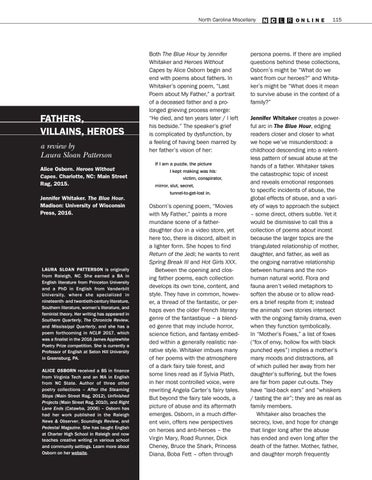North Carolina Miscellany
FATHERS, VILLAINS, HEROES a review by Laura Sloan Patterson Alice Osborn. Heroes Without Capes. Charlotte, NC: Main Street Rag, 2015. Jennifer Whitaker. The Blue Hour. Madison: University of Wisconsin Press, 2016.
LAURA SLOAN PATTERSON is originally from Raleigh, NC. She earned a BA in English literature from Princeton University and a PhD in English from Vanderbilt University, where she specialized in nineteenth- and twentieth-century literature, Southern literature, women’s literature, and feminist theory. Her writing has appeared in Southern Quarterly, The Chronicle Review, and Mississippi Quarterly, and she has a poem forthcoming in NCLR 2017, which was a finalist in the 2016 James Applewhite Poetry Prize competition. She is currently a Professor of English at Seton Hill University in Greensburg, PA. ALICE OSBORN received a BS in finance from Virginia Tech and an MA in English from NC State. Author of three other poetry collections – After the Steaming Stops (Main Street Rag, 2012), Unfinished Projects (Main Street Rag, 2010), and Right Lane Ends (Catawba, 2006) – Osborn has had her work published in the Raleigh News & Observer, Soundings Review, and Pedestal Magazine. She has taught English at Charter High School in Raleigh and now teaches creative writing in various school and community settings. Learn more about Osborn on her website.
Both The Blue Hour by Jennifer Whitaker and Heroes Without Capes by Alice Osborn begin and end with poems about fathers. In Whitaker’s opening poem, “Last Poem about My Father,” a portrait of a deceased father and a prolonged grieving process emerge: “He died, and ten years later / I left his bedside.” The speaker’s grief is complicated by dysfunction, by a feeling of having been marred by her father’s vision of her: If I am a puzzle, the picture I kept making was his: victim, conspirator, mirror, slut, secret, tunnel-to-get-lost in.
Osborn’s opening poem, “Movies with My Father,” paints a more mundane scene of a fatherdaughter duo in a video store, yet here too, there is discord, albeit in a lighter form. She hopes to find Return of the Jedi; he wants to rent Spring Break III and Hot Girls XXX. Between the opening and closing father poems, each collection develops its own tone, content, and style. They have in common, however, a thread of the fantastic, or perhaps even the older French literary genre of the fantastique – a blended genre that may include horror, science fiction, and fantasy embedded within a generally realistic narrative style. Whitaker imbues many of her poems with the atmosphere of a dark fairy tale forest, and some lines read as if Sylvia Plath, in her most controlled voice, were rewriting Angela Carter’s fairy tales. But beyond the fairy tale woods, a picture of abuse and its aftermath emerges. Osborn, in a much different vein, offers new perspectives on heroes and anti-heroes – the Virgin Mary, Road Runner, Dick Cheney, Bruce the Shark, Princess Diana, Boba Fett – often through
N C L R ONLINE
115
persona poems. If there are implied questions behind these collections, Osborn’s might be “What do we want from our heroes?” and Whitaker’s might be “What does it mean to survive abuse in the context of a family?” Jennifer Whitaker creates a powerful arc in The Blue Hour, edging readers closer and closer to what we hope we’ve misunderstood: a childhood descending into a relentless pattern of sexual abuse at the hands of a father. Whitaker takes the catastrophic topic of incest and reveals emotional responses to specific incidents of abuse, the global effects of abuse, and a variety of ways to approach the subject – some direct, others subtle. Yet it would be dismissive to call this a collection of poems about incest because the larger topics are the triangulated relationship of mother, daughter, and father, as well as the ongoing narrative relationship between humans and the nonhuman natural world. Flora and fauna aren’t veiled metaphors to soften the abuse or to allow readers a brief respite from it; instead the animals’ own stories intersect with the ongoing family drama, even when they function symbolically. In “Mother’s Foxes,” a list of foxes (“fox of envy, hollow fox with black punched eyes”) implies a mother’s many moods and distractions, all of which pulled her away from her daughter’s suffering, but the foxes are far from paper cut-outs. They have “laid-back ears” and “whiskers / tasting the air”; they are as real as family members. Whitaker also broaches the secrecy, love, and hope for change that linger long after the abuse has ended and even long after the death of the father. Mother, father, and daughter morph frequently
